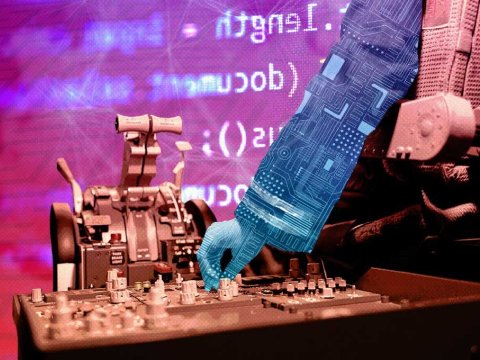How AI Can Empower Healthcare to Achieve Better Outcomes — from Efficiency to Patient Care
Discover the current state of AI adoption in the healthcare industry and the potential for transformation and improved patient outcomes. Learn how AI benefits healthcare organizations, practitioners, and patients, and explore the challenges that need to be addressed for successful AI implementation.
Although AI has been on the horizon for over a decade, it seems like it became a leading technology overnight. Organizations in every industry are embracing it in new ways and exploring its potential to reshape their businesses.
The recent rapid ascendancy of AI is due to its expanding capabilities — an increase that has only just begun. According to one study, AI has improved rapidly over the past decade, largely driven by advances in machine learning, deep learning, data science and statistical prediction.
To achieve the results that healthcare organizations are hoping for will require overcoming several challenges. One of the biggest is breaking down data silos so that their data can flow securely in and out of AI technologies.
Healthcare: AI laggard or leader?
With virtually every industry rapidly moving to embrace AI, where does the healthcare sector stand today?
When it comes to adopting new technologies, healthcare has traditionally been considered a laggard, according to some senior healthcare leaders and analysts. For example, according to the McKinsey Digitization Index, healthcare ranks among the least-advanced industries for digitization.
However, there’s another school of thought that says healthcare made smart choices where it matters and adopted advanced technology at a steady pace. Although healthcare overall has been slow to adopt new technologies, according to the Advisory Board, there are areas of significant progress and innovation, and several reasons for optimism about future progress. In particular, many organizations have undertaken a digital transformation in ways that have made them better able to meet their mission and goals.
The future of AI in healthcare
No matter where healthcare stands at this moment, nearly all predictions indicate a surge in the use of AI in healthcare in the very near future. There are so many advantages from which healthcare can benefit. For example, AI can analyze large quantities of data — including unstructured data — that healthcare organizations store in multiple formats, including images, medical claims and clinical research trials. Within these resources, AI can assist in identifying patterns and insights that are not detectable by humans and in several other ways.
The applicability of emerging technologies, including AI, varies depending on the context. What may be a priority for an academic medical institution might not hold the same importance for a large health system focused on improving revenue management and cash flow cycles.
When healthcare organizations embrace AI, it brings significant benefits to different stakeholders, including the organization itself, practitioners, and patients. Let's explore how each of these constituents can leverage AI to achieve their goals and missions.
How AI benefits healthcare organizations
The healthcare organizations that have been slow to adopt leading new technologies are often plagued by a rash of challenges, including data silos, interoperability issues and the strain of manual processes, such as transferring patient information between systems. By leveraging the power of AI, healthcare organizations can break through their data silos and make significant strides toward improving operational efficiency.
According to Deloitte, when healthcare organizations apply AI across their value chain, they can improve consumer health and well-being and support better outcomes. The firm advises healthcare leaders to consider an enterprise-wide AI strategy to transform patient care models.
Deloitte's report states that “AI-enabled solutions can provide many benefits for organizations, such as immediate returns through cost reduction and better consumer engagement. But there’s still a lot of work to be done. It requires putting strategies into action on a functional level by communicating a clear AI vision, helping the workforce operationalize AI, and finding the right ecosystem partners to supplement technical needs.”
In a joint study by McKinsey and Harvard, researchers estimated that broader adoption of AI could lead to reductions in healthcare spending of between 5% and 10%, saving the healthcare industry $360 billion a year.
Despite the large numbers being mentioned, healthcare leaders should not overlook AI’s utility in achieving low-hanging fruit. While this may seem simplistic, smaller projects can provide useful insights that can deliver tangible benefits. One such example is revenue cycle management. To this end, purpose-built cloud solutions with built-in AI capabilities are becoming the norm in high-volume and time-sensitive operations that require running machine-learning algorithms on large data sets at low costs. Use cases include high-performance computing solutions that help fuel genomics research and drug discovery.
How AI benefits healthcare practitioners
Another area of healthcare where AI can have an impact is with doctors and nurses. When hospitals adopt AI and machine learning platforms, they enhance their technology stacks. According to Managed Healthcare Executive, this helps them improve physicians' ability to work with them.
AI provides practitioners with several advantages that enhance patient care. These benefits include:
- Streamlining time-consuming routine tasks, which simplifies their work
- Creating more time to devote to direct patient care
- Improving the diagnostic process to enable early detection and prevention of diseases
How AI benefits patients
One of the most promising aspects of AI in healthcare is its ability to transform the patient experience. Imagine a world where patient visits to a doctor’s office start with seamless automation. Front desk processes, such as filling out forms and sharing medical history information, can be digitized through intelligent document processing and generative AI applications. AI and generative-AI driven automation can extract data from images, PDFs and other formats, ensuring reusability and interoperability. This automation also extends to the submission of claim documents to payers to streamline the insurance process.
AI-powered technologies hold immense potential to transform care delivery. For instance, practitioners wearing smart glasses could provide virtual guidance to patients and conduct remote diagnoses and treatment plans through live video and audio. These AI-powered glasses could also aid in capturing documentation for educational and quality-control purposes, recording surgeries and automating procedure documentation by nursing staff.
Some of the more immediate benefits to patients that we’ll see from the deep integration of AI and healthcare include:
- Early disease detection and diagnosis: Machine learning models could be used to observe patient symptoms and collect data from medical devices, and alert doctors if risks increase.
- Reduced diagnostic imaging errors: For example, AI can detect early signs of breast cancer or other conditions as effectively as human radiologists.
- Image analytics: Expect promising results in radiology, where vast amounts of labeled images can be analyzed by machine-learning algorithms to identify nodules or early growths that aren’t necessarily picked up by the human eye.
- Personalized care: AI has the potential to leverage individual medical histories, genetic profiles and social determinants of health. By considering these factors, doctors can develop more effective treatment plans and improve patient outcomes.
- Personalized treatment: Healthcare organizations could offer patients 24-hour access to a virtual assistant that learns from patient interactions. This system could answer questions based on a patient’s medical history, preferences and personal needs.
- Patient education: AI can make education more accessible, engaging and impactful, promoting patients’ active engagement in their own healthcare journey.
- Price transparency: Data and AI can play a significant role in reducing fees and enabling comparisons so that patients can make informed decisions about their care.
- Insurance support: By analyzing medical histories, AI can help patients optimize their insurance coverage and help insurers identify fraud.
- Predicting at-risk populations: AI can gather a wide range of data on the genetic, behavioral and social conditions of at-risk populations and make significant predictions to help prevent disease and save lives.
Paving the way for the future of AI through data
Today, AI has the potential to reinvent and reinvigorate the healthcare industry in multiple areas. In fact, there is an inevitability to AI’s increasingly pervasive role in healthcare operations.
However, while the opportunities to make a positive impact on patient lives remain significant, the industry is also cautious about using AI in high-stakes clinical decisions. But there is already growing acceptance for using AI to augment administrators’ tasks, where the risk of patient harm is relatively low and there is an abundance of data to train and validate algorithms.
To prepare for this future, healthcare organizations must prioritize data organization, DataOps and interoperability. For example, to be AI-ready, data assets must be able to cater to multiple avenues of consumption, rather than just being designed for a single application.
For AI programs to be significantly successful in healthcare, attention must be paid to several areas, including:
- Add rigor to statistical analysis, modeling and clinical input as parameters of the models
- Employ user engagement as a contributing reason for modeling risk scores
- Embed AI or machine-learning models within existing workflows
Rackspace Technology is at the forefront of introducing AI to a wide swath of industries through an expanding range of services and support. As part of our commitment to staying at the forefront of technological advancements, we conducted the comprehensive "2023 AI and Machine Learning Research Report." In this report, we surveyed over 1,400 IT decision makers from around the world to gain insights into their AI adoption strategies. Among the findings:
- 69% of respondents rate AI/ML as a high priority, a 15 percentage-point increase over 2022
- 73% of respondents say they have confidence in the answers provided by AI or machine learning
- Recruiting and retaining talent are the biggest hurdles to optimizing AI/ML usage
Categories of AI models in healthcare
Selecting the appropriate AI model for a given situation is a significant challenge in the healthcare industry. Today, there are four primary categories of AI and machine-learning models used in medicine:
- Supervised models: These models learn from known patterns using labeled input data to predict outcomes. Common use: sepsis prediction in a care setting.
- Unsupervised models: These models comb through unlabeled input data and use clustering techniques to identify hidden patterns. Common use: "patients-like-me" analysis.
- Reinforced models: These models take labeled input data, interact with new data, and learn to develop a series of actions. Common use: chemotherapy, clinical trials and dosing regimens.
- Foundation Models: As Stanford HAI defines: foundation model is a "paradigm for building AI systems" in which a model trained on a large amount of unlabeled data can be adapted to many applications. Foundation models are "designed to be adapted (e.g., fine tuned) to various downstream cognitive tasks by pre-training on broad data at scale".
Take the FAIR approach to AI
Healthcare organizations can benefit from our expertise, standardized delivery practices, industry partnerships, diverse skill sets and commitment to accelerating the symbiotic, secure and sustainable adoption of generative AI solutions through the Foundry for AI by Rackspace (FAIR™).
FAIR helps you accelerate AI adoption through three distinct service offerings: Ideate, Incubate and Industrialize. Our goal is to help your healthcare organization achieve your goals using the power of AI, quickly and responsibly. Are you ready to learn how your healthcare organization can leverage the ever-expanding power and potential of AI?
Capitalize on the power of AI, quickly and responsibly with Foundry for AI by Rackspace Technology (FAIR™).
FAIR™ is at the forefront of global AI innovation, paving the way for businesses to accelerate the responsible adoption of AI solutions. FAIR aligns with hundreds of AI use cases across a wide range of industries while allowing for customization through the creation of a tailor-made AI strategy that’s applicable to your specific business needs. Capable of deployment on any private, hybrid or hyperscale public cloud platform, FAIR solutions empower businesses worldwide by going beyond digital transformation to unlock creativity, unleash productivity and open the door to new areas of growth for our customers. Learn more →

Tap into its transformative potential with Foundry for Generative AI by Rackspace (FAIR™).
About the Authors

AI Solution Architect
Suyash Bhogawar
Meet Suyash Bhogawar, a seasoned data science solutions architect with a strong focus on data engineering, MLOps and now Gen AI. With a wealth of experience in designing, developing, and deploying scalable data pipelines and cloud platform capabilities, Suyash is a valuable asset at Rackspace Technology. His expertise spans various domains, including healthcare, R&D, and life sciences. Proficient in Python, R, IaaC, and cloud platforms like AWS, Azure, and GCP, Suyash excels in delivering cutting-edge solutions to complex data challenges. He has demonstrated a passion for open-source initiatives and actively contributes to the development of standards in healthcare informatics, notably BIDS and other FAIR Data organizations. Suyash's unique blend of technical prowess and domain knowledge makes him an indispensable resource in driving innovation and transformation in the data science landscape.
Read more about Suyash BhogawarRelated Topics




